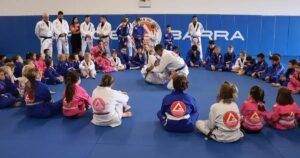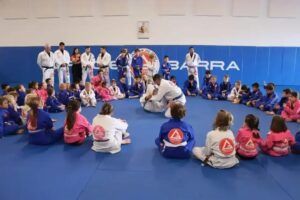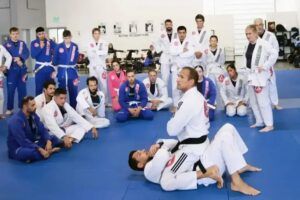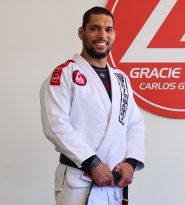This is the third article in the series BJJ Ultimate Guide: A Beginner’s Roadmap to Brazilian Jiu-Jitsu. Click to check other articles of this series.
You signed up to learn, not to win
Some things that should be obvious aren’t always clear to new practitioners. As a beginner in Brazilian Jiu-Jitsu (BJJ), you start without any specialized skills, regardless of your strength, youth, or athleticism. Expecting to win matches against those who have been training for even a few months is unrealistic. Before you focus on performing well, you need to concentrate on learning. Instead of fixating on winning, observe and learn from more experienced practitioners. By prioritizing learning over performance, you’ll avoid frustration and foster a more rewarding and productive training experience. Remember, everyone starts as a beginner; improvement comes through patience and consistent effort.
In BJJ, consistency is crucial for progress. Strive to train 2-3 times a week to maintain momentum. Drill techniques repeatedly to develop muscle memory effectively. Engage in sparring sessions to apply learned skills in a live setting, but exercise caution as a beginner—focus on learning rather than winning.
During drilling, pay close attention to details. Execute techniques slowly and precisely before gradually increasing speed. Partner drills provide insight into the nuances of each move, while solo drills enhance agility and coordination.
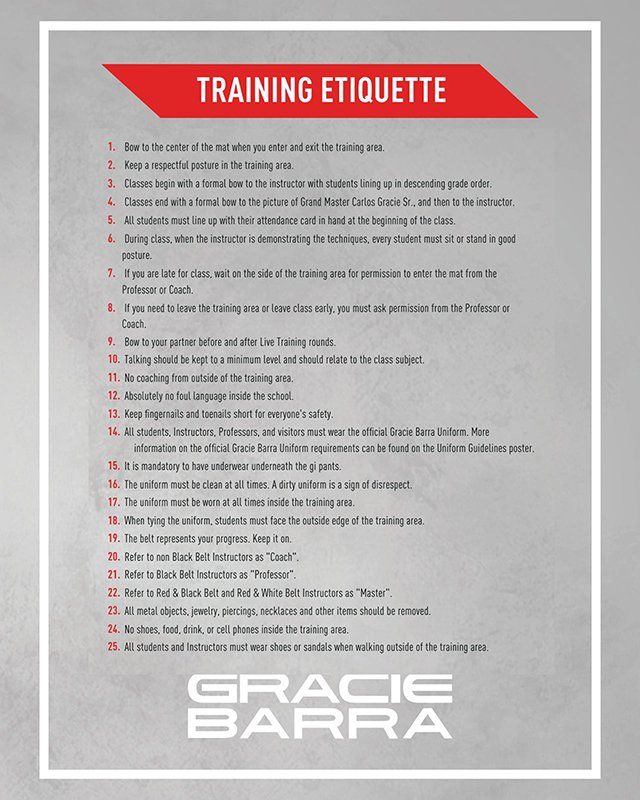
Behavior and Etiquette in BJJ Classes
Like in workplaces, libraries, or hospitals, BJJ gyms uphold specific behavior standards, which can vary depending on the team. Core values in BJJ classes include respect and humility. Always bow before stepping onto the mat and show respect to your coaches and training partners. Maintaining good hygiene is essential—wear clean gear and trim your nails to prevent injuries. Given that BJJ is a close-contact sport, cleanliness is a sign of respect for others.
On the mat, attentively listen to your instructor and follow their guidance. Policies are in place to minimize injury risks and maintain a friendly environment. Avoid coaching your peers during sparring, you are not at a tournament. At our schools in Utah, we also have our etiquette guidelines that can be an example for you, though other teams might have different levels of strictness. By following these standards, you’ll contribute to a positive and respectful training environment.
Breathe and Relax, please
One of the biggest bottlenecks for beginners in BJJ classes is being overly tense, constantly contracting muscles, and not breathing properly. This heightened tension prevents the brain from functioning optimally and restricts the body’s movement, making it difficult to execute Jiu Jitsu techniques smoothly.
Being excessively tense is like driving with the parking brake engaged—it hampers your progress and efficiency. Also, as your body isn’t relaxed enough to respond naturally to dynamic movements, improper breathing and muscle tension increase the risk of injuries. Learning to stay relaxed, breathe deeply, and move fluidly is crucial for developing effective BJJ skills and ensuring long-term enjoyment and success in the sport.
First BJJ month goals
As you embark on your first month of Brazilian Jiu-Jitsu (BJJ) classes, it’s important to set achievable goals to guide your progress. Setting specific goals regarding performance and technique is not realistic for the very first month. First and foremost, aim for consistent attendance; showing up regularly to your BJJ classes is key to building a solid foundation. Focus on understanding the basics of the sport, including the fundamental techniques and the hierarchy of positions. Learn to identify dominant positions and the flow of movement in BJJ.
Another essential goal is to practice breathing and staying relaxed during training; this will help you absorb techniques more effectively and reduce the risk of injury. By setting these broad yet vital goals, you’ll lay the groundwork for continued improvement and enjoyment in your BJJ journey.
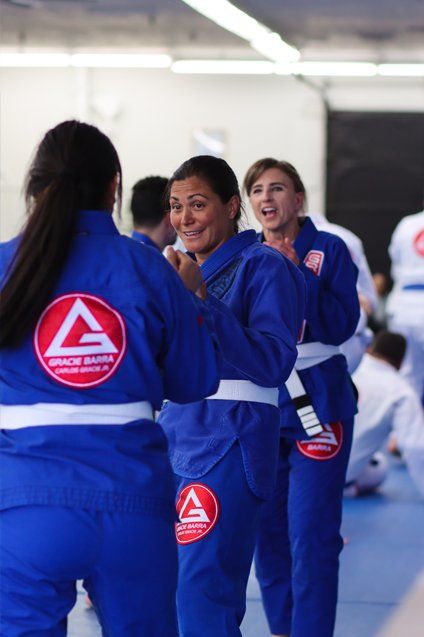
As you progress through the subsequent months as a white belt in Brazilian Jiu-Jitsu (BJJ), your primary focus should be developing strong defensive skills. Before aiming to win matches, work on becoming difficult to defeat. Concentrate on mastering escapes from common positions like mount, side control, and back control. Learning to survive and defend effectively is crucial; it builds a solid foundation for your offensive techniques in the future. Prioritize improving your positional awareness and understanding of how to stay calm under pressure. By honing your defensive capabilities, you’ll become a more resilient and formidable practitioner, setting the stage for balanced and successful growth in BJJ.
The Journey of Skill Development in BJJ: A Realistic Perspective
It’s essential to address a common expectation issue in Brazilian Jiu-Jitsu (BJJ): the time it takes to develop skills. Learning BJJ is similar to learning a foreign language. As a Brazilian who speaks English, I find this comparison quite fitting. Initially, you learn random words, colors, numbers, food names, and basic verbs, but you can’t yet hold a conversation. Similarly, in BJJ, you start with isolated techniques and movements that don’t seem to fit together. Over time, however, you begin to connect the dots.
To perform a specific technique efficiently, you need to execute several details correctly; missing even one can cause failure. However, there’s a significant difference between missing one detail and missing ten. While in both cases you may not succeed, the level of proficiency varies greatly. Therefore, it’s crucial to allow yourself the time to make mistakes, learn from them, and persist until your success rate improves.
Initially, your techniques might work only 1% of the time, but with dedication and practice, this can increase significantly. Like world-class athletes, if you commit the same effort to your training, you can achieve a high level of proficiency. Patience and perseverance are key—give yourself the grace to grow, and don’t give up until you start seeing the results you aim for.
When it comes to kids learning Brazilian Jiu-Jitsu (BJJ), it’s important to set realistic expectations based on their age, fitness levels, and natural talent. Every child develops at their own pace, and these factors can influence their progress. Younger kids might take longer to grasp certain techniques compared to older ones, while children with a natural inclination for physical activities might pick up skills more quickly. However, it’s essential to focus on each child’s journey rather than comparing them to their peers. Comparing the same child over time is a more constructive approach.
Celebrate their milestones and improvements, no matter how small, as this builds confidence and encourages persistence. By fostering a positive and supportive environment, children can thrive in BJJ, learning not only the techniques but also valuable life skills such as patience, discipline, and self-improvement.
Mastering Aggressiveness Control in BJJ Classes
In Brazilian Jiu-Jitsu (BJJ), controlling aggressiveness is a vital skill that balances assertiveness and respect. It’s crucial to demonstrate a level of aggression that prevents you from being passive or easily dominated, ensuring you’re not a “rag doll” on the mat. However, it’s equally important not to let this aggressiveness escalate to the point where you risk injuring yourself, or your training partners. Controlled aggression helps you apply techniques effectively and maintain a competitive edge, while also fostering a safe and respectful training environment.
Mastering this balance teaches valuable life skills such as emotional regulation, discipline, and empathy. By learning to channel your aggression constructively, you enhance your BJJ performance and build stronger, more positive relationships with your peers. This skill development contributes to a healthier, more sustainable practice of the sport and promotes a supportive community where everyone can thrive.
Maximizing the Benefits of Sparring as a Beginner in BJJ Classes
When a beginner starts sparring in BJJ classes it’s an exciting opportunity to apply what they’ve learned and grow as a practitioner. Sparring with higher ranks provides invaluable learning experiences; observe their techniques, ask for feedback, and focus on defense and escapes. When sparring with lower ranks, take the opportunity to practice control and refine your techniques without relying on strength.
Sparring with peers of the same rank allows you to test your skills in a more balanced setting, helping to identify areas for improvement. Also, training with individuals of different body types can enhance your adaptability and technical precision, as you learn to adjust your approach based on your partner’s size and strength. By embracing these diverse sparring experiences, you’ll develop a well-rounded game, improve your technique, and build confidence in your journey in Jiu Jitsu.
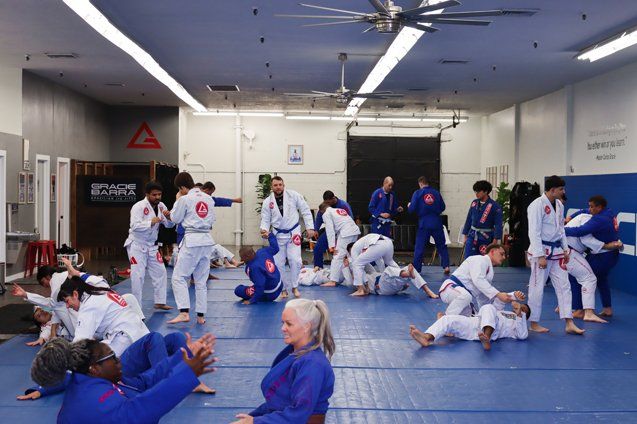
Guidelines for Training with Women in BJJ Classes
When training with women in BJJ classes, it’s important to exercise extra caution and respect. Be mindful of areas to avoid touching, and maintain a heightened awareness of your hand placements. Control your aggressiveness to ensure you’re not using excessive force, focusing instead on technique and precision.
Also, be careful with your partner’s hair; if it’s long, it might get tangled or pulled during training, so adjust your grips and movements accordingly. In Jiu Jitsu clear communication is key—don’t hesitate to ask your partner if they’re comfortable or if any adjustments are needed. By demonstrating respect and sensitivity, you create a safe and supportive training environment that benefits everyone involved.
Conclusion About Your First Month at BJJ Classes
In conclusion, your first month in BJJ classes will be all about laying a solid foundation. Focus on learning over winning, attend classes consistently, and practice respectful behavior on the mat. Relax, breathe, and take it slow to absorb techniques and prevent injuries. Setting realistic goals and embracing patience will set you up for success. Get ready, as you move into the next months of your Brazilian Jiu-Jitsu journey, you’ll dive deeper into mastering defensive skills and refining your techniques. Stay tuned for more tips on progressing from a white belt to a more skilled practitioner!

